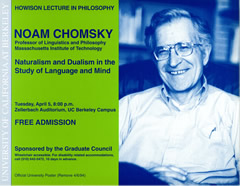
Noam Chomsky
Professor of Linguistics and Philosophy, Massachusetts Institute of Technology
Howison Lectures in Philosophy
April 5, 1994University of California, Berkeley — UC Berkeley Campus
About Noam Chomsky Noam Chomsky is one of the most influential linguists of our time and a leading political activist. He is credited with changing the focus of linguistics from a concern with methods of classification to a search for … Continued
University of California, Berkeley - UC Berkeley Campus Berkeley Graduate Lectures [email protected] false MM/DD/YYYYAbout Noam Chomsky
Noam Chomsky is one of the most influential linguists of our time and a leading political activist. He is credited with changing the focus of linguistics from a concern with methods of classification to a search for explanatory principles. Chomsky’s numerous writings in this area include Syntactic Structures (1957), which initiated a shift away from empiricism to an investigation into language as a universally human mental faculty with its own structure and principles. His rejection of behaviorism led to attempts to understand the mind as a computational system. A more recent account of Chomsky’s linguistic thought appears in Knowledge of Language: Its Nature, Origin, and Use (1986). As a libertarian socialist, Chomsky has also been a forceful critic of U.S. foreign policy and a spokesperson against all abuses of power. His books in this field include Manufacturing Consent: the Political Economy of the Mass Media (1988, with E.S. Herman) and Deterring Democracy (1991). Noam Chomsky was born in 1928 and received his Ph.D. in linguistics from the University of Pennsylvania in 1955. He joined the Massachusetts Institute of Technology faculty in 1955 and has been a professor there since 1961. He has received various honorary degrees, awards and other honors, and is a member of several learned societies, including the American Academy of Arts and Sciences and the National Academy of Science.